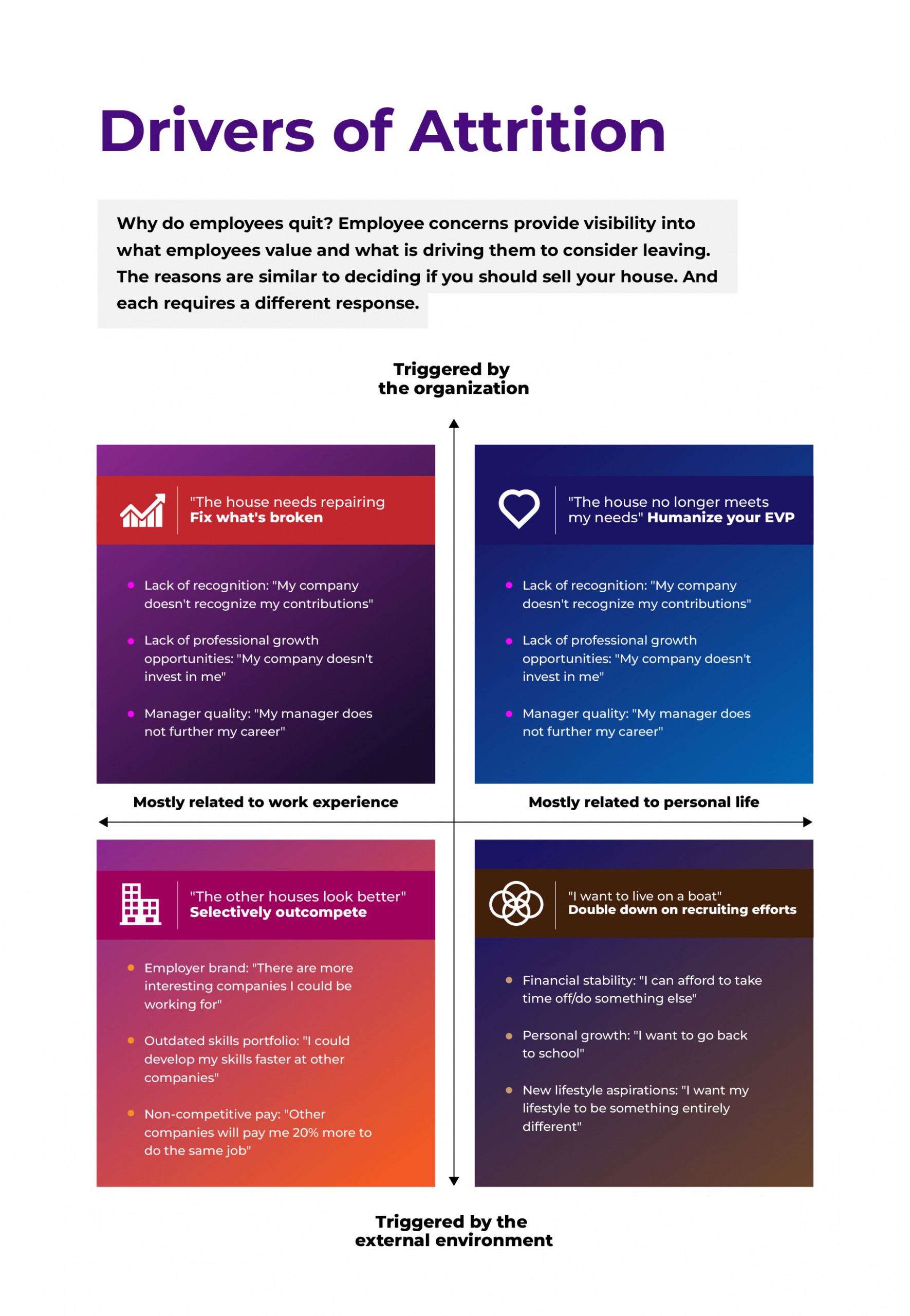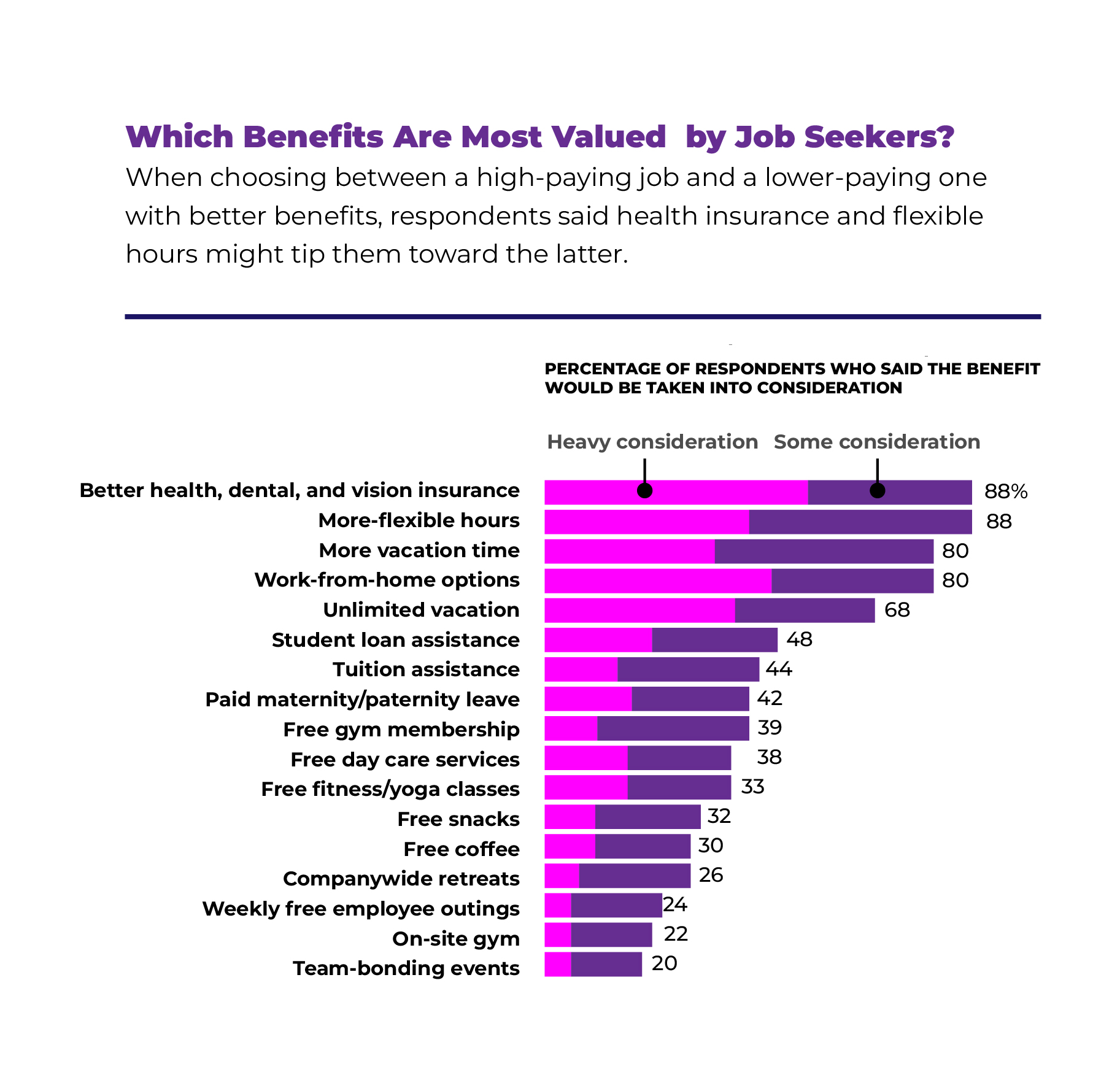The right talent, at right place on right time
We all agree to the fact that Talent/Employees are the most essential aspect of a business that powers it to unprecedented levels of growth. The right talent at right place at the right time will deliver value that other factors simply cannot. However, in the wake of the COVID-19 pandemic and global headwinds in organizational workflow, the Great Resignation started making headlines and without the Organizations realizing this also turned into a period of Great Retention.
Most businesses weren’t prepared for it, others faced challenges in retaining their employees, and all this was primarily because they were not addressing the critical problem:
This brings us to the bigger Question……
“What are employees of this generation looking for at their workplace?”
Catering to Employees Need Along with Business Need
The World is undergoing a so-called the 4th Industrial Revolution (“THE IT REVOLUTION”). The majority of the workforce now is made up of millennials and members of Gen Z, who do not experience the same problems as their previous generations did, such as a lack of employment opportunities and a reluctance to work in the IT sector.
The modern workforce seeks independence and a relaxed, independent work atmosphere. Most of your staff don’t require constant micromanagement. That’s one of the strategies to having your best employees onboard. We can even see current people trend and Indications that can be derived from reports/experience.
What are Certain Drivers for Attrition??

Fig 2: Primary reasons for employees wanting to quit
Image credit: gartner.com
As per a Gartner report, organizations are likely to see some significant trends:
- It is estimated that the employee turnover will increase by 20% in the near future.
- Close to 81% of employees can work in a hybrid or completely remote environment and will choose to do so.
Why is it so, and what can businesses do to curb the attrition rate in turbulent times? That’s the burning question you must find the answer to as a business owner.
As an organization we need to understand ways of building a Tailored Work Culture while Standing Ahead, Behind and Most Importantly, With Your Team and Company.
What is Culture?
Culture is the tacit social order of an organization: It shapes attitudes and behaviors in wide-ranging and durable ways.
How can Leaders play a part in Maintaining, Developing or Promoting Organization Culture?
Leaders play a critical role in maintaining, developing, and promoting organizational culture. They set the tone for the organization, and their actions and behaviors send a strong message to their employees about what is valued and important.
When it comes to reducing attrition in the modern workplace, age-old strategies like wage raises, promotions, and financial bonuses are no longer effective. Giving your employees timely feedback and showing appreciation for their hard work will go a long way. Show your team that you are an integral part of the group and not just a Superior Figurehead.
Along with that, there are specific management skills that one must develop as well as teach to our teams, “Actions speak louder than words,” which means that if you lead by example, your team will eventually become excellent. Here are some specific ways that I as a leader do to play a part in shaping organizational culture:
Appreciate/Feedback: Appreciating your team in public and giving feedback in a closed room goes a long way. When you put the spotlight of appreciation on your team and defend them when there are escalations, your team will deliver more than 100% and will have your back when you need their support.
When you start working with your team, set some ground rules with them and self, such as
- Set Expectations:
-
-
- There will be NO reminders/follow-ups to anyone, including yourself. You need everyone on the team to be self-driven.
- Each team member must adhere to the commitment made and hold themselves accountable, irrespective of the situation.
- All team members will work equally. Having one person work for 16 hours and another one for only 2 hours a day isn’t the right way. The whole team should stay and work together to ensure timely delivery.
-
- Foster a hierarchy-free organizational structure.
Convey to your team that everyone is reachable to them, no matter the position. If they have consulted with their immediate seniors and didn’t find a solution, they should be able to reach out to top management for a resolution however keeping in mind the value and duration of time that can be made available to be more effective in their asks.
- Develop a disciplined work & learning approach.
Allow your team to use some of their official work hours to work on a professional growth initiative, i.e., ask them to keep aside 3-5 hours per week for a new learning (it can be related to their current work or the future expected or their future role), they should reconcile then every quarter and present to their peer for mutual inputs and feedback
- Train the trainer – Senior executives can train the managers, who can then train the team leads, who will subsequently train the entry-level employees, resulting in an inclusive, knowledge-enriched culture, this goes along with the approach as mentioned in points #2 above, it also develops a relationship between team which helps in a good work environment and closeness specially post covid where it’s mostly Hybrid work so always, Groom Next Level and build a rapport with them : this is one aspect, if you won’t groom them then they won’t grow which means you don’t have a person to replace you to move up and if you don’t have a rapport then again they aren’t going to be groomed well and support you when needed most.
- Show your team a Path, Guide and Support to Grow – It’s put as last point here to ensure it stays with every beautiful mind who reads this, as an individual we all want our Career path to grow and see who can help us growing in it, Sharing a Personal Experience
‘Few years back one of the associate asked “what’s in it for me?” while discussing his annual performance and salary revision, well my answer was a question to him “what do you need?”, and his answer was simple, I need to grow as Tech Manager and since I had been one, I gave details on how he can take that path and what all as an organization and myself as individual can support and guide him and now after years I see him a very successful Tech Manager who not only get client applauds but also his teams trust.’
- Always build professional relationship with your team, leadership and HR/Finance/Operation and meet them on frequents basis, there is a saying “Out of Sight is Out of Mind” and the best way to get a resolution is relationship, that always help and that can be built only after we meet/connect.
- Good Listeners :: a leader always listens to their team or even to Seniors, just lend them your ears, one Manager I distinctly remember, I was lucky to have her, she used to listen to me whenever I was frustrated because of stress or other reasons, her approach of listening helped me to think in a positive direction to move and even helped me to take a Breath and start afresh, leading to solutions. Learn to Breath and take a step back. Also, listening or discussing helps us to connect better and understand the TONE of Voice or Facial Expressions which we miss badly in mails, keep in mind a mail is always read they was reader is seeing not the way sender sends it.
- Power of Acknowledging : If you are Marked in TO of any email, then reply is a MUST within 24 hours : whether just saying “ON IT”, and don’t ever forget to apologize even if it’s your team’s mistake, I had an incident when I was working as Delivery Manager, one of my Project Manager came to me and said, the Tech Lead does so many mistakes and he wants customer to know it. then I called and showed him my mail where I have apologized for my team (including him) mistakes hundreds of time and then fixed them (that’s also an important part, Own when you can close and Close when you Own), he immediately understood and then even ended up becoming buddy to that Tech Lead.
- Let your team make mistakes, there isn’t a single person in world who has a 100% success rate. Let people learn from their mistakes, and then lead to improve on processes and finally the results. I remember my time as Tech lead, when one complex code was assigned to a team member by my manager, and since it was to be done within time, he panicked however started working but was unable to meet deadline. Even after giving him inputs when asked, however as Lead, I did the coding myself on another Dev instance and delivered to client on time, he also completed coding but took few days extra, however that point was recorded in his mind and when we met (after 10-12 years) he remembered and shared with me as how I covered his back and now he covers his teams in same way.
- No escalations should go beyond self, and if it does, make sure that the management is aware about it before it reaches them. Do not write BAD/-ive to anyone over mails or any other medium. Express you concerns, problems and situations in a concise, effective and formal manner for maximum impact.
- Trust your intuition: intuitions are results of complex estimations that your mind does in the subconscious, and just like wisdom, it matures overtime. One should in major cases be able to trust it in many cases without over thinking.
What do Some Survey’s from Major Organizations say about the Needs/Expectations of Millennials?

Source: Harvard business review: Special issue Fall 2019
And how does this differ between the Gender Group:

Source: Harvard business review: Special issue Fall 2019
Note: the survey results shared is done for a total employees Count of 2000 working in various Organizations in USA.
Below are some examples where employee friendly policies have yielded in retaining top talent
Google is famous for its over-the-top perks, which include lunches made by a professional chef, biweekly chair massages, yoga classes, and haircuts.
Twitter employees enjoy three catered meals per day, on-site acupuncture, and improv classes.
But what should a company do if it cannot offer advantages comparable to those of Google and Twitter? Offering enticing extras doesn’t have to be expensive, but we may attempt to take advantage of every opportunity to give staff members a better work-life balance.
Problems Arising from Employee Absence
Even doing everything people do choose to leave, and managers need to be prepared. To ensure NO negative impact on work, here are a few solutions that can be adopted:
#1 – What’s the backup plan for an employee on leave?
Your clients are only interested in delivery. The problem arises when a team member is on leave and deadlines are approaching. How do you maintain delivery continuity?
I have personally seen the effectiveness of two specific approaches to tackle this problem:
- Having a buddy – When you assemble a team for any project, ensure each team member has a buddy, a backup to bank upon in times of need. In emergencies, the person’s buddy can take over the work responsibilities to maintain workflow continuity.
- Having junior associates – Only having a buddy as backup is not enough. A junior associate or a team of them can prove extremely valuable in assisting seniors with their deliverables.
#2 – What’s the plan if an employee resigns?
As a person who has extensively devised different methodologies for employee retention and attrition mitigation, I see this as the priority among priorities.
When an employee leaves your company, it creates a void since they also take with them the time, knowledge and money invested in them, with them. Looking for a replacement involves several interviews and post-hiring training, and 95% of the time, you will most likely not find an exact match.
You must introspect and see why that attrition happened in the first place. What could have been done to prevent it?
However still work needs to be delivered, so bring next level one level up and do it till last level and then fill that last level, this even helps in team balance, however this might not work always so keep searching for people.
Apart from that you connect with Employee on frequent basis will be able to help you understand their current views and work with them to even find replacement so that you are prepared for the worst.
Do you think employees are more empowered now than in the past?
Yes. Because internal communications may now be heard outside of a business through social media, they are given a lot more weight. Glassdoor is a prime illustration. There may have been companies in the past that were not the best places to work, but very few people were aware of them. Since it is posted on a platform like Glassdoor, the entire world is now aware of it, turning businesses into transparent glass homes. People are now able to go inside and see what is going on before deciding whether they want to work there. Hence Organizations need to be cautious of the actions/decisions they take internally.





